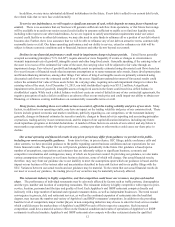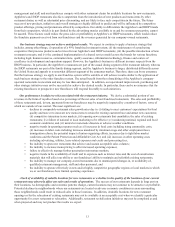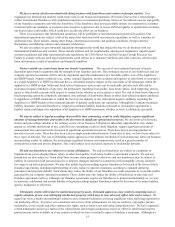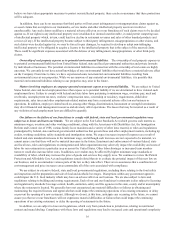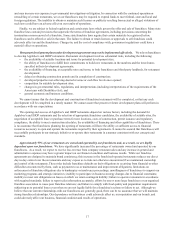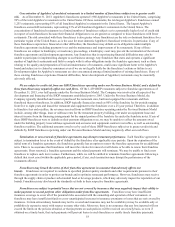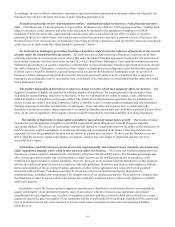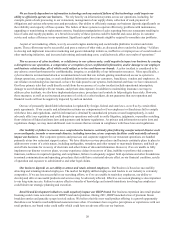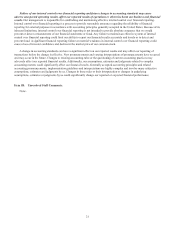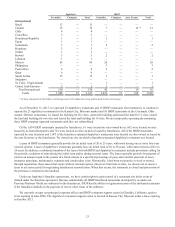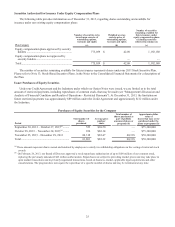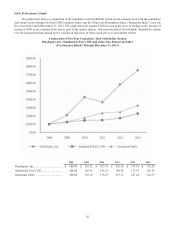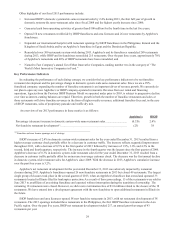IHOP 2013 Annual Report Download - page 40
Download and view the complete annual report
Please find page 40 of the 2013 IHOP annual report below. You can navigate through the pages in the report by either clicking on the pages listed below, or by using the keyword search tool below to find specific information within the annual report.19
Accordingly, in cases in which a franchisee experiences increased insurance premiums or must pay claims out-of-pocket, the
franchisee may not have the funds necessary to make franchise payments to us.
Franchisees generally are not “limited purpose entities,” making them subject to business, credit, financial and other
risks. Franchisees may be natural persons or legal entities. Franchisees are often not “limited-purpose entities,” making them
subject to business, credit, financial and other risks which may be unrelated to the operations of Applebee's or IHOP
restaurants. These unrelated risks could materially and adversely affect a franchisee and its ability to make its franchise
payments in full or on a timely basis. Any such decrease in franchise payments may have a material adverse effect on us. See
the Risk Factor titled “An insolvency or bankruptcy proceeding involving a franchisee could prevent the collection of payments
or the exercise of rights under the related franchise agreement,” below.
An insolvency or bankruptcy proceeding involving a franchisee could prevent the collection of payments or the exercise
of rights under the related franchise agreement. An insolvency proceeding involving a franchisee could prevent us from
collecting payments or exercising any of our other rights under the related franchise agreement. In particular, the protection of
the statutory automatic stay that arises under Section 362 of the United States Bankruptcy Code upon the commencement of a
bankruptcy proceeding by or against a franchisee would prohibit us from terminating a franchise agreement previously entered
into with a franchisee. Furthermore, a franchisee that is subject to bankruptcy proceedings may reject the franchise agreement
in which case we would be limited to a general unsecured claim against the franchisee's bankruptcy estate on account of
breach-of-contract damages arising from the rejection. Payments previously made to us by a franchisee that is subject to a
bankruptcy proceeding also may be recoverable from us on behalf of the franchisee as a preferential transfer under the United
States Bankruptcy Code.
The number and quality of franchisees is subject to change over time, which may negatively affect our business. Our
Applebee's business is highly concentrated in a limited number of franchisees. We cannot guarantee the retention of any,
including the top performing, franchisees in the future, or that we will maintain the ability to attract, retain, and motivate
sufficient numbers of franchisees of the same caliber. The quality of existing franchisee operations may be diminished by
factors beyond our control, including franchisees' failure or inability to hire or retain qualified managers and other personnel.
Training of managers and other personnel may be inadequate. These and other such negative factors could reduce the
franchisee's restaurant revenues, impact payments to us under the franchise agreements and could have a material adverse effect
on us. In the case of Applebee's, these negative factors would be magnified by the limited number of existing franchisees.
The inability of franchisees to fund capital expenditures may adversely impact future growth. Our business strategy
includes the periodic updating of Applebee's and IHOP restaurant locations through new remodel programs and other
operational changes. The success of our business strategy will depend to a significant extent on the ability of the franchisees to
fund the necessary capital expenditures to aid the repositioning and re-energizing of the brand. Labor and material costs
expended will vary by geographical location and are subject to general price increases. To the extent the franchisees are not
able to fund the necessary capital expenditures, our business strategy may take longer to implement and may not be as
successful as we expect.
If franchisees and other licensees do not observe the required quality and trademark usage standards, our brands may
suffer reputational damage, which could in turn adversely affect our business. We license our intellectual property to our
franchisees, product suppliers, manufacturers, distributors, advertisers and other third parties. The franchise agreements and
other license agreements require that each franchisee or other licensee use the intellectual property in accordance with
established or approved quality control guidelines. However, there can be no assurance that the franchisees or other licensees
will use the intellectual property assets in accordance with such guidelines. Franchisee and licensee noncompliance with the
terms and conditions of the governing franchise agreement or other license agreement may reduce the overall goodwill
associated with our brands. Franchisees and other licensees may refer to our intellectual property improperly in
communications, resulting in the weakening of the distinctiveness of our intellectual property. There can be no assurance that
the franchisees or other licensees will not take actions that could have a material adverse effect on the Applebee's or IHOP
intellectual property.
In addition, even if the licensee product suppliers, manufacturers, distributors, or advertisers observe and maintain the
quality and integrity of our intellectual property assets in accordance with the relevant license agreement, any product
manufactured by such suppliers may be subject to regulatory sanctions and other actions by third parties which can, in turn,
negatively impact the perceived quality of our restaurants and the overall goodwill of our brands, regardless of the nature and
type of product involved. Any such sanctions or actions could reduce restaurant revenues and corresponding franchise
payments to us.





